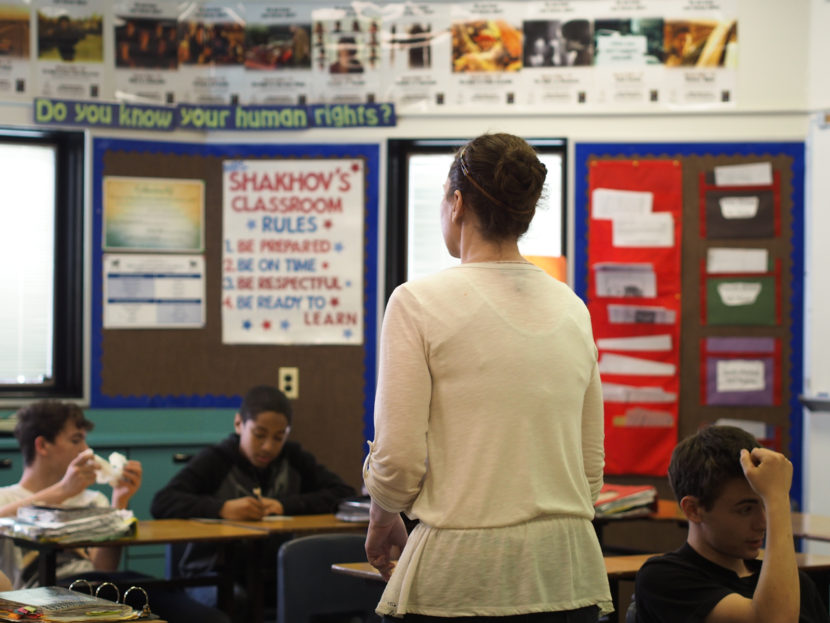
In order to fight rising property crime, Anchorage needs more police. That’s the conclusion of a group of miniature experts, a class of eighth graders in Eagle River. And they think they’ve got a solution for city leaders.
“I need everyone’s attention right up here,” said Tonya Shakhov to the 21 students in her seventh period social studies class. “Which group would like to share?”
It’s a warm, sunny day at Gruening Middle School just a few days before summer vacation, and the class is talking about crime.
“Some of you said, ‘Well we can never stop crime all together.’ Was that our goal?” Shakhov asked.
“No,” replied a small smattering of students.
“So what was our goal then?”
“To reduce it,” came the enthused response.
The class was wrapping up something called Project Citizen, a three-month-long educational program designed to engage students in the civic process for addressing community problems. On this particular day, the class is recapping what worked.
Initially, they considered focusing on education funding or school lunches. But when students started doing interviews with parents and teachers about problems facing the municipality, they heard a lot of concerns over rising crime rates. So they began researching the topic for themselves.
“We also had to write down every website and look at it to see if there was any good information,” said Tyler Ormsbee. He and his class partner Matthew Rainey explained how they went about finding data to bring into class discussions.
“Neighborhood Watch,” Rainey said, rattling off sites.
“I used the FBI crime rates,” Ormsbee jumped in.
Gruening Middle School is in Eagle River, a corner of the municipality of Anchorage that has long enjoyed a reputation as a neighborly, semi-rural suburb free of big city problems like high crime rates.
But that’s changing. The area’s assembly representatives held a public forum earlier in May focused on a perception that drug use and property crime are on the rise.
“I was talking to my mom, like, ‘I don’t think crime is that big of an issue,’ and she was like, ‘Oh yeah it is!’” recalled Gabby Schilling. “And I realized crime is a really, really big issue.”
Schilling explained that around the time the class started its research, there was an incident at the daycare where she volunteers that put the topic front and center for her. A teacher’s car was broken into in the parking lot, and some college textbooks were taken.
For Schilling, seeing how disruptive and unnerving the theft was for someone she actually knew added a human face to all the data she was encountering in the classroom.
“Sometimes when you’re looking at statistics you normally just see, ‘Oh, that’s 84, cool, it’s just a number,’” she said. But pouring over news accounts of people’s personal experiences changed things for Schilling. “The stories behind those statistics were amazing. It’s just really personal when you realize that they’re individual people, instead of numbers.”
According to recent data from the Anchorage Police Department, crime in Eagle River is not rising — in fact, by a lot of measures it’s nudging downward after decades of steadily declining.
But that’s not what these students perceive. And Schilling adds that even though the crime rate has gone down, it’s still stubbornly and unacceptably high.
The solution arrived at by the class is hiring more police officers, a view shared not only by the police department itself, but the Berkowitz administration, too. The students started a media campaign, writing letters to policymakers and news organizations, one of which arrived at the offices of Alaska Public Media, politely asking for help raising awareness about police staffing levels, and signed in cursive by Gabby Schilling.
This is the fifth year Shakhov has run Project Citizen, and she’s used to classes picking topics like crime, substance abuse, and suicide that are grim, but keep students invested. Her priority, though, is getting young people engaged in the civic process itself.
“Year after year, when kids come back and visit me they ask ‘Are you still doing Project Citizen?’” Shakhov said, adding that past students often tell her the experience made them realize they don’t have to wait for adulthood to begin working for change.
